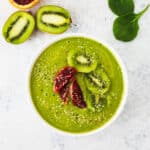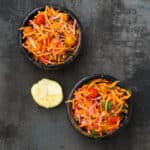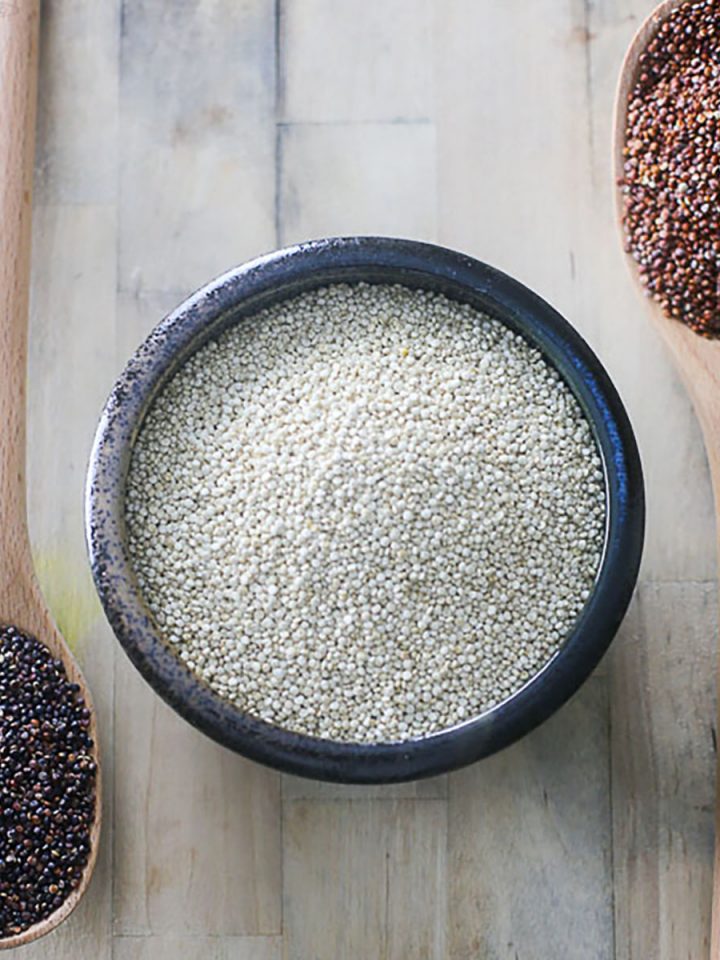Are oats healthy? This popular breakfast staple boasts a wealth of nutritional benefits and versatility, making it a smart addition to your diet. But like any food, there are potential downsides to consider. In this blog post, we'll explore the health benefits of oats, possible health concerns, and tips for choosing and storing oats to maximize freshness and flavor.

Oats have grown in popularity around the globe over the last couple of decades. Oat porridge is understandably a breakfast staple in hospitals, as I observed during my stay in the top heart hospitals in the U.S. But you can find this breakfast staple everywhere: hotels, student dining halls, small to big cafes. Many processed cereal brands have also thrived with the growing popularity of oats, which many of us view as healthy.
Jump to:
Oats: a long history of usage in the human diet
Oats have a surprisingly long history [1]! While a common sight in today's grocery aisles, humans have enjoyed oats for thousands of years. Archeologists discovered traces of wild oats on an ancient tool, resembling a modern-day pestle in a cave in Italy, suggesting consumption as far back as 32,000 years ago [2]. Oats arrived in the Americas in the 17th and 18th centuries [1].
While many oat species exist, the common grocery store variety is Avena sativa. This nutritious grain belongs to the Poaceae grass family – the same as wheat, corn, rice, barley, and millet. Did you know that oat grass, the leafy part of the oat plant, is packed with antioxidants and has potential health benefits? (We'll dive into that later!)
Are oats gluten-free?
Are oats gluten-free? It depends. Fresh crop oats are naturally gluten-free. However, during processing, they often get cross-contaminated with gluten-containing grains (like wheat, rye, or barley). Additionally, some people, especially those with celiac disease or gluten sensitivity, may react to avenin, a protein in oats. To be safe, choose certified gluten-free oats. If you still experience symptoms, consider whether avenin might be responsible for the allergic reaction.
Can you eat raw oats?
Oats offer a safe and nutritious way to add texture and fiber to foods like smoothies, yogurt parfaits, overnight oats, and energy bars and balls. However, as discussed later, soaking them beforehand improves digestibility and helps your body absorb the most nutrients. Because oats can be consumed raw, they become a great base for energy bars and balls. You can find several yummy energy balls and bars on trafficlightcook.com.
Oats protein content
While oats are often considered a grain with high carbohydrate content, oats have higher protein content than many other grains (around 11-17% by dry weight).
Why are oats good for you? Health benefits
Oats contain (beta) β-glucan, a highly viscous soluble dietary fiber that prevents a sharp rise in blood sugar levels after eating despite their high carbohydrate content. Oats are also rich in thiamine, zinc, magnesium, and phosphorous minerals. Due to their high mineral and fiber content, oats are linked with several health benefits.
Some benefits stem from eating oats in less processed (whole) forms--steel cut and traditional oats. Oats are linked with the following health benefits:
Heart and digestive health hero
- While the research is ongoing, studies suggest that whole grain intake may be associated with a lower risk of heart disease. Regardless, whole grains offer a clear advantage: they are packed with more nutrients and fiber than their white-grain counterparts [3]. Studies suggest that a daily intake of around 3-3.5 grams of beta-glucan may be linked to reduced LDL ('bad') cholesterol. (4, 5 ).
- The fiber in whole grains promotes digestive health by adding bulk to stool and preventing constipation, but remember to drink plenty of water to prevent constipation.
Blood Sugar Control potential
- The soluble fiber in oats, especially beta-glucan, slows down the digestion of carbohydrates. This helps prevent spikes in blood sugar levels, a crucial aspect of managing and preventing type 2 diabetes [6].
- Studies suggest oats may improve insulin sensitivity, meaning your body can use insulin more effectively to keep your blood sugar in check.
A Potential Cancer-Fighting Powerhouse
Studies show a positive association between oat phytochemicals and reduced cancer risk [7]. Polyphenols are potent antioxidants that are known to fight cancer potentially. Oats (Avena sativa L., Poaceae) are a unique source of avenanthramides (AVAs), a type of polyphenol that may have specific anticancer properties [8].
Weight Control Promise
Oats are incredibly filling thanks to their high content of beta-glucan fiber. This fiber absorbs water, increasing the volume of food in your gut and slowing down digestion. This extended fullness can help with weight management, though more research is needed for conclusive evidence. For the best satiety benefits, choose less-processed oats like steel-cut or rolled oats over ready-to-eat cereals.
Health Concerns about Oats
A food ingredient could be super healthy, but it still may not be best for you, as our unique bio-individuality plays a big part in deciding which foods work for our bodies and which ones don't. While no major downsides are associated with oats, be aware of the following health concerns.
- Gluten Sensitivity: Oats are naturally gluten-free. However, cross-contamination with gluten-containing grains is common, as they are often processed with gluten-containing grains. If you have a gluten allergy, i.e., celiac disease or gluten intolerance, it's best to buy certified gluten-free oats. Some people may react to avenin, a protein in oats. Oat allergies can manifest quickly or have delayed symptoms [9]
- Digestive Issues: Oats are high in fiber, which can cause bloating, gas, or discomfort if introduced too quickly into the diet. It's best to start with small portions and gradually increase. Always drink plenty of water throughout the day, especially when eating high-fiber foods; otherwise, high fiber can cause constipation.
- Phytates: As discussed, Phytates in oats can bind to minerals like iron and zinc, potentially hindering absorption. Soaking, sprouting, or fermenting oats can reduce phytate levels.
- Weight Gain (If Overconsumed): Oats are calorie-dense, so overconsumption can contribute to weight gain. It's best not to rely on a single ingredient, irrespective of the ingredient's healthfulness status. Mindful portion sizes are key, especially when including toppings.
Should you soak oats before cooking? How to Reduce Phytates?
Phytates (the common name for phytic acid and its common salts) are the primary storage form of phosphates and inositol in all seeds and grains. Phytates are also anti-nutrients that bind with essential minerals such as copper, calcium, zinc, magnesium, and iron [10].
The main concern with excess phytates in your diet is that they can bind to essential nutrients like iron, zinc, and calcium, preventing their absorption. This can lead to deficiencies. However, phytates also have potential health benefits. They may act as antioxidants, reducing harmful free radicals, and could even play a role in preventing osteoporosis [11].
The question of whether to reduce phytates in oats is complex. Phytates can hinder the absorption of essential minerals like iron and zinc. However, they may also offer health benefits. If you have mineral deficiencies such as iron and frequently eat oats, legumes, and other grains, consider reducing phytates in your diet.
Oats contain phytates just like other grains. While it is easy to reduce phytates in most grains and legumes by cooking, oats don't respond well to just plain cooking. The best way to reduce phytates in oats is by soaking and germinating oats [12].
Depending upon how much phytate you want to reduce in oats, you could either soak them for 24 hours or soak them with a couple of tablespoons of lemon juice (or apple cider vinegar) for 12-24 hours. Soaking also results in faster cooking time and creamier oats.
For almost phytate-free oats, you can buy sprouted/germinated oats. I have tried One Degree and Pure Living (no affiliation) and liked both brands.
Sprouted oats can easily spoil due to moisture from the germination process. Always smell and inspect them for signs of fungus before using.
How to Keep Oats Fresh: Tips for Buying and Storing
Buy organic oats to reduce chemical exposure
In 2018, a California jury awarded $289 million to Dewayne Johnson, a school groundskeeper in California dying with terminal cancer. Johnson had non-Hodgkins's lymphoma, which the jury found to be caused by Roundup--the world's most popular weed killer that Johnson applied on school grounds 20-30 times per year. What's the connection between this case and oats? Oats are treated with glyphosate--an herbicide and the main ingredient in Roundup. Imagine eating a weed killer for breakfast! According to the Environmental Working Group (EWG) test results, several popular oat cereal brands, including Quaker and Cheerios, tested high in glyphosate.
The solution: buy organic oats. According to consumerlab.com, organically grown oats still could contain some glyphosate due to cross-contamination, but the amount is within the permissible limits that are touted to have no negative effect.
Best not to buy oats in bulk
Grains aren't often associated with fat, but all grains contain some – and oats actually have a higher fat content than many others. This makes them more prone to going rancid over time. If you're buying oats from bulk bins, give them a sniff before purchasing to check for any rancid smell.
Determine how fast you go through your oats, and buy no more than one month's supply at a time.
- If buying packaged oats, it's best to check the expiry date on the package.
- If you buy oats from open bins, as I do, ensure they are adequately stored with a tight cover, and the store has a good turnover. When buying from open bins (or packaged) be sure to look for presence of moisture as even a little bit of moisture can cause fungus.
- Store in an airtight container at home in a dry, cool, and dark place. Never handle dry oats with wet hands or spoons.
Clearly, oats deserve a spot in your pantry! Whether you love a classic bowl of oatmeal or get creative with oat-based recipes, there are endless ways to enjoy their benefits. Experiment with different types, toppings, and preparations to find your favorite ways to incorporate oats into your meals.

















Leave a Reply